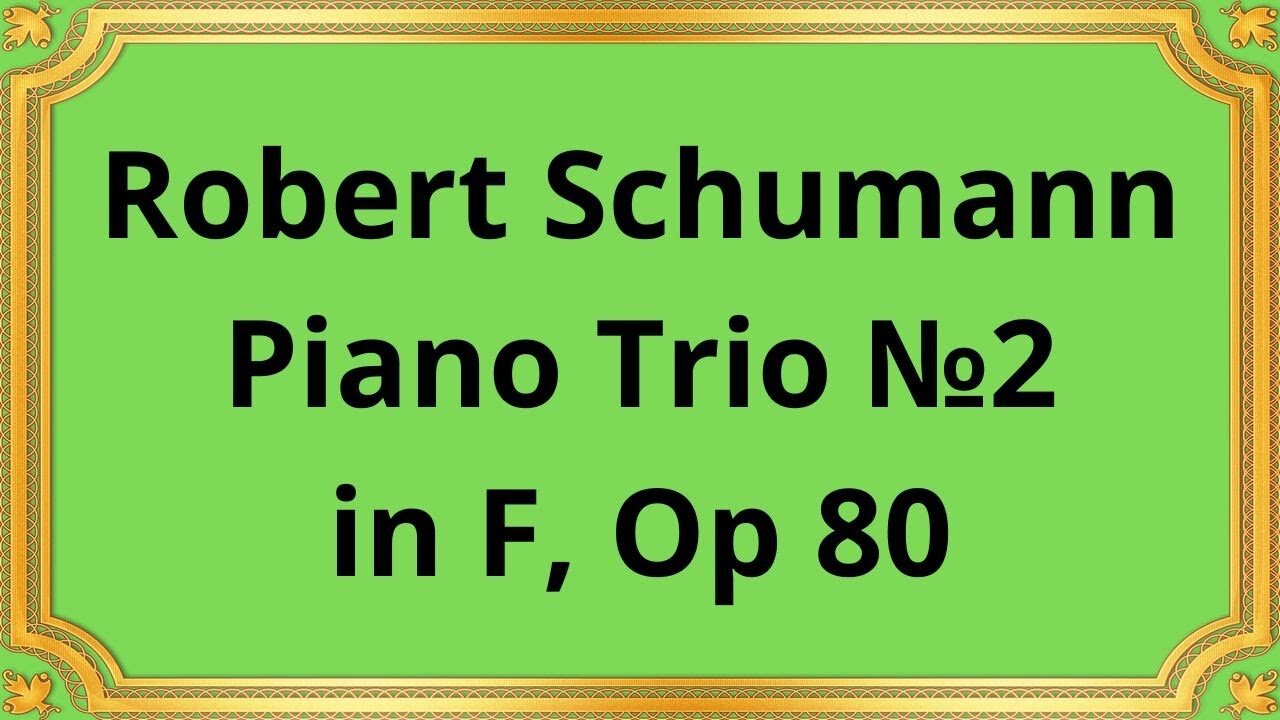Premium Only Content

Robert Schumann Piano Trio №2 in F, Op 80
#RobertSchumann #PianoTrioNo2 #FMajor #Opus80 #ClassicalMusic #MusicalComposition #RomanticEra #Piano #GermanComposer #ChamberMusic #PianoTrio #MusicalExpression #EmotionalDepth #19thCentury #MusicHistory #EuropeanClassicalTradition
Beaux Arts Trio
Robert Schumann's Piano Trio No. 2 in F, Opus 80, is a captivating and emotionally charged musical composition that showcases the composer's profound ability to convey intricate emotions through music. Composed for piano, violin, and cello, this chamber music masterpiece from the Romantic era exhibits Schumann's unique blend of lyrical melodies, rich harmonies, and expressive depth.
Robert Schumann, a prominent German composer of the 19th century, was renowned for his contributions to the Romantic movement. The Piano Trio No. 2 in F, Opus 80, composed in 1847, is a significant work in Schumann's chamber music repertoire. It is believed to have been inspired by the tragic events surrounding the death of Schumann's brother, Julius, which greatly affected the composer's emotional state during the composition process.
The Piano Trio No. 2 in F, Opus 80, is structured in four movements, each with its distinct musical character and emotional landscape. The first movement, marked "Sehr lebhaft" (Very lively), opens with an energetic and triumphant theme, filled with dramatic flourishes and virtuosic passages. The second movement, "Mit innigem Ausdruck" (With heartfelt expression), offers a contrasting introspective and melancholic mood, featuring a beautifully lyrical melody.
The third movement, "In mäßiger Bewegung" (In moderate motion), introduces a scherzo-like character, with playful and lively interactions between the instruments. Finally, the fourth movement, "Nicht zu rasch" (Not too fast), concludes the trio with a spirited and joyous finale, showcasing Schumann's ability to create a sense of exuberance and celebration.
The Piano Trio No. 2 in F, Opus 80, holds significant importance in the realm of classical music. It stands as a testament to the Romantic era's emphasis on individual expression, emotional depth, and the exploration of profound human sentiments through music. Schumann's ability to convey a wide range of emotions, from joy and triumph to introspection and sorrow, demonstrates his exceptional compositional skills.
Furthermore, the Piano Trio No. 2 has played a pivotal role in the development of chamber music. It showcases Schumann's innovative approach to the piano trio genre, with its intricate interplay between the three instruments and its exploration of contrasting moods and musical ideas. The piece has influenced subsequent composers and has contributed to the rich tapestry of chamber music within the European classical tradition.
Conclusion:
Robert Schumann's Piano Trio No. 2 in F, Opus 80, is a masterpiece that continues to captivate audiences with its expressive beauty and emotional depth. Through its four movements, this composition showcases Schumann's ability to create a profound musical narrative, blending lyrical melodies, rich harmonies, and intricate emotions. Its significance in the world of classical music, as well as its influence on subsequent composers, solidifies its place as a cherished gem within the European classical tradition. The Piano Trio No. 2 stands as a testament to Schumann's genius, leaving a lasting legacy that continues to inspire and resonate with music enthusiasts around the world.
You have the opportunity to support the channel:
https://destream.net/live/RadSiarAl/donate
https://www.buymeacoffee.com/6355radsiaral
-
 48:22
48:22
Classical music_Music Inspiration
1 month agoHector Berlioz Fantastic Symphony
741 -
 LIVE
LIVE
The Jimmy Dore Show
1 hour agoTulsi’s New REVERSE Russiagate Investigation! Trump Breaks EVEN MORE Promises to MAGA! w/Dave DeCamp
4,369 watching -
 2:52
2:52
Gamazda
2 days ago $0.74 earnedPiano Meets Rock: I Love Rock 'N Roll Cover
1.29K14 -
 LIVE
LIVE
The Mike Schwartz Show
5 hours agoTHE MIKE SCHWARTZ SHOW Evening Edition 07-21-2025 with Guest DAN NUNN!
4,257 watching -
 1:22:41
1:22:41
Kim Iversen
2 hours agoThe U.S. Is the #1 Buyer of Sex With Children—Here’s Why No One Talks About It
67K16 -
 DVR
DVR
StoneMountain64
6 hours agoStealth Ghillie Sniper and Warzone Challanges I may hate
1.86K -
 LIVE
LIVE
Robert Gouveia
2 hours agoHunter Biden MELTS DOWN! Garrett Ziegler REACTS! Dems Getting NERVOUS!
1,435 watching -
 24:44
24:44
Scary Mysteries
7 hours ago5 CREEPY Small Town Murder Mysteries That Remain Unsolved
4.11K1 -
 21:40
21:40
Preston Stewart
6 hours ago $0.14 earnedUkrainian Drones Hunt Russian Soldiers
3.24K2 -
 57:00
57:00
BEK TV
21 hours agoFAITH, FREEDOM, AND UNEXPECTED DISHWASHER HACKS: ANTHONY DESTEFANO & TYLER O’NEIL JOIN THE LADIES
1.08K